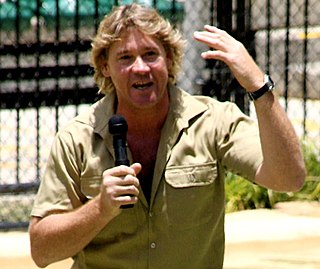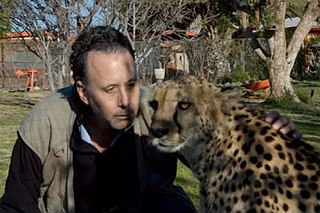A Quote by Carl Zimmer
Researchers keep identifying new species, but they have no idea about the life cycle of a given species or its other hosts. They cut open an animal and find a new species. Where did it come from? What effect does it have on its host? What is its next host? They don't know and they don't have time to find out, because there are too many other species waiting to be discovered and described.
Related Quotes
When a parasite moves to a new habitat, it can find new hosts through a process called the trans-species jump. Often, the new host has no resistance; it and the parasite haven't had time to adjust to each other through natural selection (it is frequently not in the best interest of a parasite to kill its host quickly).
It must be stressed that there is nothing insulting about looking at people as animals. We are animals, after all. Homo sapiens is a species of primate, a biological phenomenon dominated by biological rules, like any other species. Human nature is no more than one particular kind of animal nature. Agreed, the human species is an extraordinary animal; but all other species are also extraordinary animals, each in their own way, and the scientific man-watcher can bring many fresh insights to the study of human affairs if he can retain this basic attitude of evolutionary humility.
The big question that scientists haven't even begun to get an answer for is how many species of microorganisms are there? Now, this is not stamp collecting. What we need is experts totally devoting their research to everything they can find out about every species, in a community of scientists who appreciate that every fact counts...everything new you learn about any species in any group is worth publishing somewhere.
The human species was given dominion over the earth and took the opportunity to exterminate other species and warm the atmosphere and generally ruin things in its own image, but it paid this price for its privileges: that the finite and specific animal body of this species contained a brain capable of conceiving the infinite and wishing to be infinite itself.
A species has to become pretty intellectually advanced in order to grasp the concept of death in the abstract, and to dream up the idea of immortality. Long before that (in evolutionary terms) all species with brains have the survival instinct in some form. So, I am just saying that there are many existent proofs of species that have one, but not the other.
What I'm starting to really grapple with, as someone who likes to tell stories, is that humans more than any other animal species seem open and willing to control, assert dominance, and behave cruelly. That's a whole kind of new nightmare to really have to face about your own species. That we are, in some respects, cannibalistic, in that we are willing to destroy ourselves. That's really something for me to be exploring over the long haul.
Clearly, we are a species that is well connected to other species. Whether or not we evolve from them, we are certainly very closely related to them. A series of mutations could change us into all kinds of intermediate species. Whether or not those intermediate species are provably in the past, they could easily be in our future.
From the point of view of the species, death is part of this whole process. You could say that species have evolved in such a way that individual members last a certain time. Perhaps a certain kind of species would be better able to survive if the individuals didn't last too long. Other kinds could last longer.





































